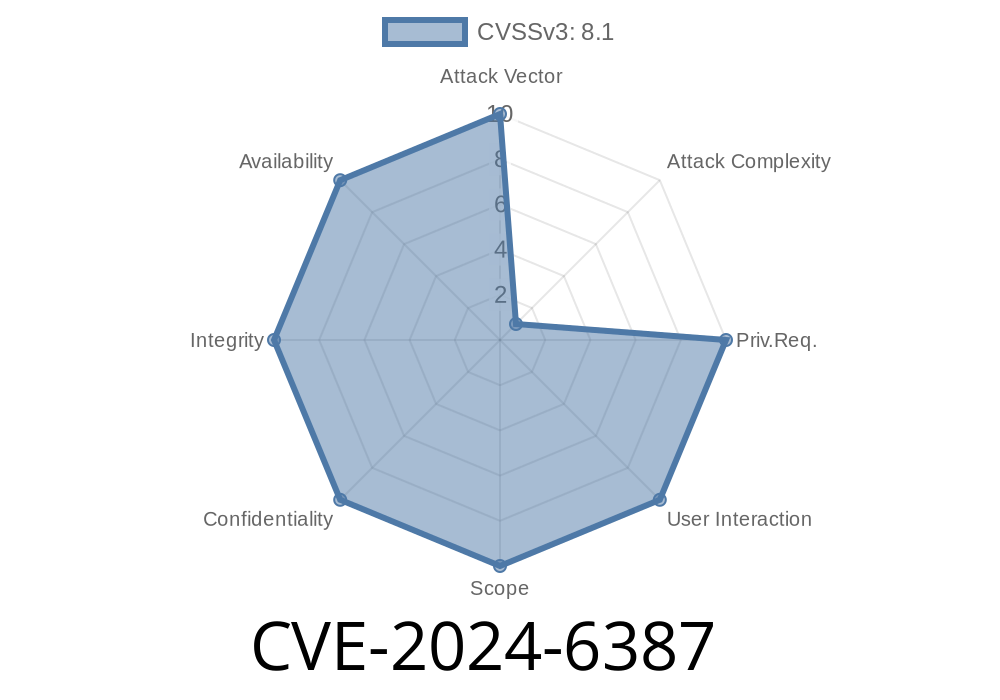OpenSSH is the backbone of secure shell access across millions of servers. But even the most trusted foundations can get cracks. In July 2024, CVE-2024-6387 revealed a dangerous vulnerability in the OpenSSH server (sshd), rooted in careless handling of Unix signals and unsafe function calls. This post will break down what went wrong, why it matters, provide code snippets, original reference links, and explain how attackers might exploit this bug—all in simple American English.
What is CVE-2024-6387?
CVE-2024-6387 is a critical vulnerability found in OpenSSH's sshd, more precisely in its handling of login grace timeout. When an SSH client connects but does not authenticate within the LoginGraceTime window (by default 120 seconds, or 600 seconds in older versions), sshd’s SIGALRM signal handler triggers and cleans up the authentication attempt. The problem? The signal handler calls functions like syslog(), which are _not_ “async-signal-safe” — they’re not supposed to be used from inside a signal handler. This mistake opens up a "race condition," a timing bug that clever hackers can exploit.
Who Is Affected?
- OpenSSH server (sshd) on all Unix/Linux platforms
- OpenSSH versions prior to the fix in July 2024 (see the commit link below)
The Technical Root: Signal Handlers and Async-Signal-Safe Functions
On Unix/Linux, a _signal_ can interrupt your program at any time. Some functions — like write() — are safe to call from a signal handler, but most higher-level C library functions (including syslog()) are not. If you use these in a signal handler, memory and state can get corrupted, leading to unpredictable behavior and even code execution.
Newer OpenSSH code already moved logging out of the signal handler, but older code remains vulnerable.
Vulnerable Code Snippet
Here’s a simplified version of the dangerous signal handler in OpenSSH's sshd (not the real code, but close to the problem):
void grace_alarm_handler(int sig) {
syslog(LOG_NOTICE, "Login grace time expired, terminating connection");
cleanup_and_exit(255);
}
// During setup:
signal(SIGALRM, grace_alarm_handler);
The syslog() call is not safe inside that handler. If an attacker can manipulate the state of the process while this handler runs, they can cause memory corruption.
Exploiting CVE-2024-6387: Proof of Concept
Attackers can exploit this bug by forcing sshd to handle many incoming connections that timeout (never complete authentication), causing the grace time handler to fire rapidly. By racing this event and keeping the server busy (rapid connect/disconnect), it may be possible to crash sshd — or, as shadowserver writes, even execute arbitrary code in some circumstances.
Trigger SIGALRM by exceeding LoginGraceTime on many connections at once
Tools like ssh-audit or even simple bash scripts can automate this:
while true; do
nc -w 2 target.sshd.server 22
done
In parallel, sophisticated attackers might target memory corruption to attempt code execution.
The Fix
OpenSSH maintainers patched this with this commit, moving logging and other dangerous calls _outside_ the signal handler, into safe parts of the code.
If you run any SSH server
Update OpenSSH immediately (patched versions after July 1, 2024).
References & Further Reading
- OpenSSH Github Commit (Fix)
- OpenWall Advisory
- Qualys Security Advisory on CVE-2024-6387
- NIST NVD Entry
- Shadowserver Post (Impact)
## How to Patch/Vaccinate Your Server
Restrict access: Use firewalls, allow only trusted connections (or use fail2ban).
- Shorten LoginGraceTime: For extra safety, set LoginGraceTime to a low value in /etc/ssh/sshd_config.
In Summary
CVE-2024-6387 is a stark reminder: Unix signals are tricky, and code that’s “good enough” for decades can still hide show-stopping bugs. Don’t wait — patch your servers today and keep reading for real-world security news.
Stay safe out there!
Have further questions? Leave a comment or visit the OpenSSH mailing list for more updates.
Timeline
Published on: 07/01/2024 13:15:06 UTC
Last modified on: 07/02/2024 03:55:36 UTC
